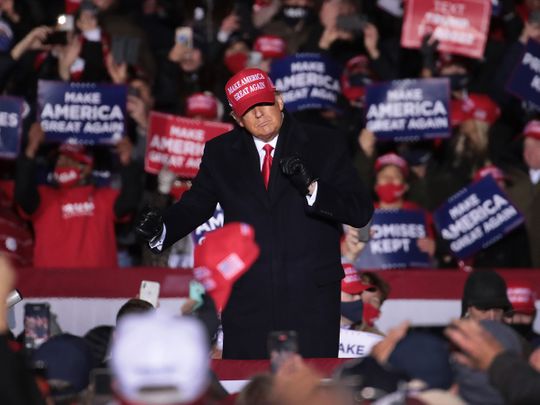
US President Donald Trump's pledge to fight the outcome of the election in the courts crashed Friday into skeptical judges, daunting Electoral College math and a lack of evidence for his claims of fraud.
On a day that began with vote tallies in Georgia and Pennsylvania tipping in Joe Biden's favor, Trump's campaign declared, "This election is not over," as the Republican National Committee announced it had activated "legal challenge teams" in Arizona, Georgia, Michigan and Pennsylvania. And the Trump forces named a new general to lead the effort, hardened conservative political combatant David Bossie.
But none of the dozen or so lawsuits they had brought in battleground states appeared to be gaining any traction in the courts. And in any case, none seemed likely to give Trump the edge he would need in vote counts in the states that will determine the outcome.
Supreme court asked to step in
The most high-profile step of the day came when Pennsylvania Republicans asked the US Supreme Court to step in and require election officials in the state to segregate ballots that arrived after Election Day and not to include them for now in the vote totals in the largest and most critical of the swing states.
On Friday evening, Justice Samuel Alito agreed to the request.
But Pennsylvania is already segregating those ballots, counting them separately and is not including them in the announced vote totals.
The secretary of state, over the objections of Republicans and Trump, has said they can be counted if they arrived by 5 pm Friday, in line with a state court ruling that the Supreme Court has left open the possibility of reviewing again.
A state official said the ballots in question number in the thousands but not tens of thousands.
Their lack of progress in stopping the count or making a persuasive case for large-scale ballot fraud left Trump and his team increasingly reliant for political salvation on recounts - which appeared likely to take place in Georgia, Nevada, Arizona and Wisconsin but which rarely result in big swings in vote counts.
The Trump effort may be getting a boost from state legislatures in Pennsylvania and Wisconsin, which are both controlled by Republicans. In Wisconsin, Robin Vos, speaker of the state Assembly, directed a legislative committee to "use its investigatory powers" to conduct a review of the election, again raising the specter of voter fraud without offering specific evidence.
In Pennsylvania, the two top Republicans in the legislature called on Gov. Tom Wolf, a Democrat, to conduct "an immediate audit" of the election.
At the same time, allies of the president openly suggested an extreme move: to use baseless allegations of Democratic malfeasance to pressure Republican-controlled state legislatures in key states to send pro-Trump electors to the Electoral College regardless of the results of the popular vote.
Officials with the Biden campaign said they would meet every legal challenge Trump brought but said they were confident that none of the cases they had seen so far seemed likely to loosen Biden's tightening grasp on the presidency.
"The Republican legal claims are utterly baseless and have failed and will continue to fail in the courts," said Bob Bauer, a senior adviser to the Biden campaign. "They serve no purpose other than to echo Donald Trump's discredited and shameful attack on the democratic process."








